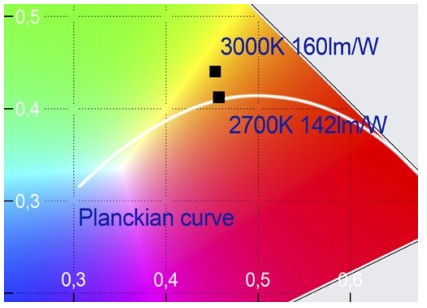Peak values right on the Planckian curve
OSRAM Opto Semiconductors has set a new laboratory record of 142 lm/W for the efficiency of a warm white LED light source. With a correlated color temperature (CCT) of 2755 K the LED achieves a good color rendering index (CRI) of 81. Measurements were taken under standard conditions: room temperature and pulsed mode at an operating current density of 350 mA/mm².
Bright warm white light with high efficiency is particularly important for lighting applications in the residential sector. The laboratory setup for a warm white LED shows the enormous potential of these energy-saving semiconductor light sources: The peak value of 142 lm/W measured under standard conditions is achieved at a color perception that very closely matches that of a classic incandescent lamp (color coordinates cx 0.46/ cy 0.41 on the Planckian curve).
“If we explore this technical approach further and allow deviations from the Planckian curve we should even now be able to achieve higher efficiency values of up to 160 lm/W for a correlated color temperature of 3000 K (cx 0.45/ cy 0.44)”, said Dr. Norwin von Malm, Predevelopment Manager at OSRAM Opto Semiconductors. “If we apply this approach to a 2 mm² chip we can improve efficiency by a further 10 to 15 percent for the same operating current. We would then expect 180 lm/W for a pure warm white LED and good color rendering.”
The increase in efficiency was made possible by combining new procedures in thin-film and UX:3 chip technologies and in conversion. Development engineers at OSRAM Opto Semiconductors have benefited here from combined know-how in all aspects of the production process. These include epitaxial growth, thin-film chip architectures, conversion processes and package technologies.

The laboratory setup for a warm white LED achieves a peak value of 142 lm/W directly on the Planckian curve at 2700 K; an optimized setup at 3000 K could achieve 160 lm/W





 CN
TW
EN
CN
TW
EN






